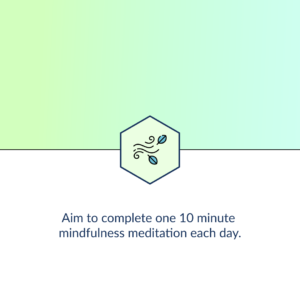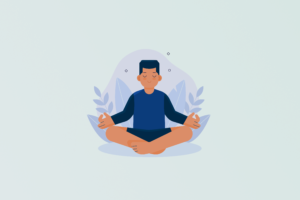
Kayleigh | Dysautonomia, Anxiety & Depression
How I manage Dysautonomia, PoTS, Mastocytosis, Anxiety, and Depression Interview & article by Jesse Driessen.Published 7th June 2024. Kayleigh lives with Dysautonomia, Postural tachycardia syndrome

The information shown on this page has been crowd-sourced anonymously from members of the Bearable community who live with Anxiety disorders and who have used Meditation as part of their self-management routine.
2.5
out of 5
Some improvement
in Anxiety
3.92
out of 5
Moderate improvement
in Well-being
100%
of reviews reported
An improvement
in some aspect of health
We asked members of the Bearable community to share their recommendations and reviews of their experience using Meditation for Anxiety.
I used the headspace app to do 10mins of meditation a day, usually their specific Managing Anxiety course. Doing the activity every day is key. It’s gradually but noticeably checking my relationship with anxiety symptoms, making them shorter in duration and easier to deal with in the moment.
Meditation helped me understand my changes from depressed to manic and stop myself from going too far or deep into either of them.
I use the Calm app at least once a day and aim to meditate between 5-10 minutes
Meditation helped me take a step back, think about what was said and not react to the first emotion I was feeling
Meditation helped me get more rest and decrease stress
I practice meditation every day and would highly recommend this to others
Meditation helps for anxiety and emotion regulation. I use the app “Petit Bambou” which has some different options for guidance. My psychologist guided me through my first meditation session. I now meditate once a day.
Meditation helps with individual symptoms as well as my overall mood. I use a paid subscription to the Down Dog app at home as well as an in-person class once a week to keep me motivated.
The information on this page is collected from our community of hundreds of thousands of people who live with and manage multiple chronic health conditions and disorders. If you’ve had your own experience with using meditation to manage anxiety, we’d love for you to submit your own review.
The ratings and reviews on this page are updated monthly and we’ll incorporate your feedback into the next update. To submit your own review of meditation on anxiety, please complete the form linked below.
Meditation is a practice where an individual uses a technique—such as mindfulness, focusing the mind on a particular object, thought, or activity—to train attention and awareness and achieve a mentally clear and emotionally calm, stable state. It is often linked to spiritual traditions, but in modern times, it is also widely used as a secular practice for mental and physical well-being.
Key Aspects of Meditation:
Mindfulness: This involves being fully present and engaged with the moment, aware of your thoughts, feelings, and sensations without judgment. It’s a common form of meditation that is often used in therapeutic settings to reduce stress and anxiety.
Focused Attention: Many meditation practices require focusing attention on a specific object, such as the breath, a word (mantra), or a visualization. This helps in reducing distractions and calming the mind.
Open Monitoring: Instead of focusing on a single object, the practitioner remains open to any experience that arises in the present moment, observing thoughts and sensations as they occur without getting attached to them.
Mental Health: Meditation has been shown to reduce symptoms of anxiety, depression, and stress. It can also improve emotional regulation and increase self-awareness.
Physical Health: Regular meditation can lower blood pressure, improve sleep, and boost the immune system. It may also help with managing chronic pain.
Cognitive Functioning: Studies suggest that meditation can enhance focus, memory, and executive functioning, potentially slowing the cognitive decline associated with ageing.
Anxiety disorder is a mental health condition characterized by excessive and persistent worry, fear, or nervousness that interferes with daily activities. Unlike the occasional anxiety that everyone experiences in response to stressful situations, anxiety disorders involve intense, prolonged symptoms that can be debilitating.
Types of Anxiety Disorders.
Generalized Anxiety Disorder (GAD): This involves chronic, exaggerated worry about everyday life events without any obvious reason for concern. People with GAD often anticipate disaster and may worry excessively about health, money, family, or work.
Panic Disorder: This is characterized by sudden and repeated episodes of intense fear, known as panic attacks. These attacks often occur without warning and include physical symptoms such as chest pain, heart palpitations, dizziness, and shortness of breath.
Social Anxiety Disorder: Also known as social phobia, this involves an intense fear of social situations where one might be judged, embarrassed, or humiliated. It can lead to avoidance of social interactions, significantly affecting personal and professional life.
Specific Phobias: These are intense, irrational fears of specific objects or situations, such as heights, flying, or certain animals. The fear often leads to avoidance behavior that can disrupt daily life.
Obsessive-Compulsive Disorder (OCD): Though often considered separately, OCD involves anxiety driven by unwanted, intrusive thoughts (obsessions) and repetitive behaviors (compulsions) performed to reduce anxiety.
Post-Traumatic Stress Disorder (PTSD): Though categorized separately, PTSD is closely related to anxiety disorders. It occurs after experiencing or witnessing a traumatic event and involves flashbacks, severe anxiety, and uncontrollable thoughts about the event.
Anxiety disorders can be caused by a combination of genetic, environmental, psychological, and developmental factors. Risk factors include a family history of anxiety disorders, stressful or traumatic life events, and certain physical health conditions.
Psychotherapy: Cognitive-behavioral therapy (CBT) is one of the most effective forms of psychotherapy for treating anxiety disorders. It helps individuals identify and challenge negative thought patterns and behaviors.
Medications: Antidepressants, benzodiazepines, and beta-blockers are commonly used to manage symptoms, often in combination with therapy.
Lifestyle Changes: Regular exercise, stress management techniques, and mindfulness practices like meditation can help reduce anxiety symptoms.
According to the National Institute of Mental Health (NIMH), anxiety disorders are among the most common mental health conditions, affecting millions of people worldwide. Despite their prevalence, they are highly treatable with the appropriate interventions.

How I manage Dysautonomia, PoTS, Mastocytosis, Anxiety, and Depression Interview & article by Jesse Driessen.Published 7th June 2024. Kayleigh lives with Dysautonomia, Postural tachycardia syndrome

Mindfulness Meditation Aim to complete one 10-minute mindfulness meditation each day. 🗓️ This experiment lasts for 14 days. Why do this experiment? 😌 Stress Reduction:

For most of my adult life, I’ve been interested in personal development. Interested in trying new things that can accelerate my personal growth, improve my